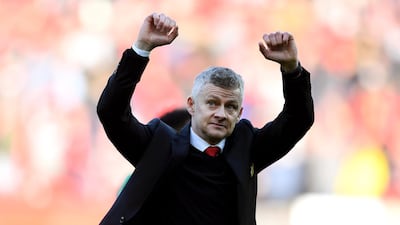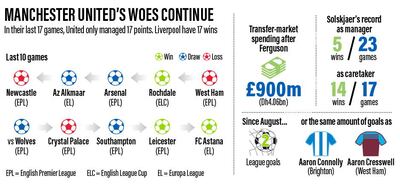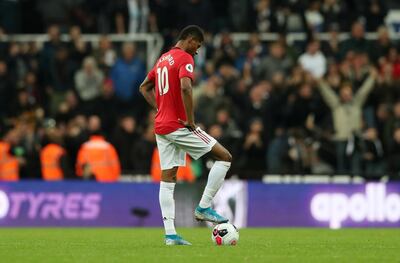Manchester United’s executive vice-chairman, Ed Woodward, believes the club cannot be considered successful until they get back to winning the Premier League.
Since Woodward became United’s leading executive in 2013, the English giants have spent £900 million on new players and possess the highest wage bill in the division. However, they have not come close to winning the league title.
In an extended, exclusive interview with the United We Stand fanzine, Woodward was asked to explain recruitment failures, a lack of investment in the infrastructure and his own role on the football side of the club.
When asked about the pressure he is under from United supporters to return the club to its status as the dominant force of English football, and whether failure to do so could cost him his position, Woodward replied: “I understand the scrutiny; it’s part of the job.
“We have to do everything that we possibly can to get back to winning the Premier League. We are not successful until we do. Second is not success, we have to win the Premier League."
Woodward insisted the club are moving forward: "I feel that we are on the right track to get back to that point but we are going to have to be patient.”
Ole Gunnar Solskjaer is the man entrusted to deliver results on the pitch. The Norwegian was appointed manager following the departure of Jose Mourinho last December, first as interim then – after a fine run of 14 wins in 19 games – on a permanent basis in March.
Results since then have been poor as United sit in the bottom half of the table, with the team's struggles in front of goal symbolic of their recent decline.
While Solskjaer is under pressure himself, it is Woodward who faces greater scrutiny as the man who not only appointed the former United striker, but the three managers – David Moyes, Louis van Gaal, and Jose Mourinho – who failed in the dugout following Sir Alex Ferguson's retirement in 2013.
Asked about United’s track record of managerial appointments since Ferguson’s departure, Woodward said: “The communication of the high level direction and vision and strategy that we had from a football perspective had become blurred.
"We hired Ole because he syncs with that vision. The people and structures that we are putting in place are there to support that vision are in place for now and in the future.”
And what exactly is that vision? “Winning; playing attacking football with players that have an ‘x-factor’; and giving youth a chance," Woodward said.
"Added to that, we want players to come in who respect their teammates, the club, the history. They must understand that they are creating a legacy by coming to Manchester United. Nobody is bigger than the club.
"There should be both a humbleness and an arrogance. Humble when you are on the team coach and you wear the club suit, you do up your top button and wear your tie, you represent the club in the right way. Then you sign autographs for the people who pay your wages.
"Then, when you go into the dressing room, you put the red shirt on and you feel arrogant, self assured. As Michael Carrick said in his book, you want to take the ball, you want the ball in tight spaces, you want a never-say-die spirit. Ole has brought a lot of the discipline back.
“Whatever manager we have has to buy into that philosophy and Ole is a walking, talking version of that. Let’s let this play out with Ole in terms of the culture reboot.”

Who decided the "culture reboot"? Woodward was guarded in his response: “I’m not going into the detail, but clearly there are a lot of people discussing those things at a senior level within the club.
“Let Ole continue. I think there will be a better understanding of who we are and what we are, which will resonate with fans who have been around for a long time.”
There were no complaints from fans when Solskjaer was appointed, and those same fans still support him, but Woodward has been questioned for the decision to appoint the Norwegian on a permanent basis before Champions League football had been secured for 2019/20.
“It wasn’t pivotal to it one way or another,” he said. “I want to take a long-term view. Being distracted by short term things can be dangerous when you are making cold, calm, long-term decisions. Ole was hired with the long-term view that he will be successful.”
Woodward was also keen to explain why the end of last season was so disastrous. After that impressive run while in caretaker charge – which included a comeback win over Paris Saint-Germain in the Champions League last-16 – United proceeded to win two of their remaining 12 games in all competitions under Solskjaer.
“I can’t deny that, [Solskjaer] can’t deny that and everyone is putting their hands up," Woodward said. "But I also spoke to some of the players at the end of the season and they said it was the hardest season they had experienced.”
He describes last season as falling into three parts: “A tough first phase in terms of the environment they were in and a huge amount of media scrutiny.
“Then there was a fantastic run when Ole came in as caretaker. Then there was the ‘when is Ole going to get the job?’ stage with more scrutiny which evolved into a time when it didn’t work in terms of what the players were delivering on the pitch. That mental and physical situation shattered them.
“Ole had switched them almost immediately into playing a more dynamic style of football, of one pass through the middle not multiple passes, ball possession but counter attack at pace. That created an increased level of load that the players were not ready for. The decision to appoint him wasn’t based on Champions League qualification.”
And presumably if Woodward’s words are a guarantee, Solskjaer’s continuation in the post won’t hinge on what is an unlikely qualification for next year.
















